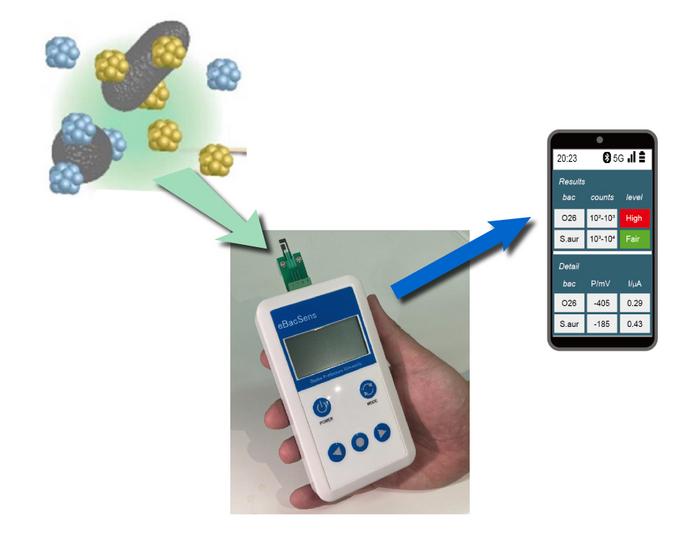Hear the words E. coli or salmonella and food poisoning comes to mind. Rapid detection of such bacteria is crucial in preventing outbreaks of foodborne illness. While the usual practice is to take food samples to a laboratory to see the type and quantity of bacteria that forms in a petri dish over a span of days, an Osaka Metropolitan University research team has created a handheld device for quick on-site detection.

Credit: Hiroshi Shiigi, Osaka Metropolitan University
Hear the words E. coli or salmonella and food poisoning comes to mind. Rapid detection of such bacteria is crucial in preventing outbreaks of foodborne illness. While the usual practice is to take food samples to a laboratory to see the type and quantity of bacteria that forms in a petri dish over a span of days, an Osaka Metropolitan University research team has created a handheld device for quick on-site detection.
Led by Professor Hiroshi Shiigi of the Graduate School of Engineering, the team experimented with a biosensor that can simultaneously detect multiple disease-causing bacterial species within an hour.
“The palm-sized device for detection can be linked to a smartphone app to easily check bacterial contamination levels,” Professor Shiigi explained.
His team synthesized organic metallic nanohybrids of gold and copper that do not interfere with each other, so that electrochemical signals can be distinguished on the same screen-printed electrode chip of the biosensor. These organic−inorganic hybrids are made up of conductive polymers and metal nanoparticles. The antibody for the specific target bacteria was then introduced into these nanohybrids to serve as electrochemical labels.
Results confirmed that the synthesized nanohybrids functioned as efficient electrochemical labels, enabling the simultaneous detection and quantification of multiple bacteria in less than an hour.
“This technique enables rapid determination of the presence or absence of harmful bacteria prior to shipment of food and pharmaceutical products, thereby helping to quickly ensure safety at the manufacturing site,” Professor Shiigi said.
The team aims to develop new organic metallic nanohybrids to simultaneously detect even more bacterial species.
The findings were published in Analytical Chemistry.
###
About OMU
Established in Osaka as one of the largest public universities in Japan, Osaka Metropolitan University is committed to shaping the future of society through “Convergence of Knowledge” and the promotion of world-class research. For more research news, visit https://www.omu.ac.jp/en/ and follow us on social media: X, Facebook, Instagram, LinkedIn.
Journal
Analytical Chemistry
DOI
10.1021/acs.analchem.3c04587
Method of Research
Experimental study
Subject of Research
Cells
Article Title
Simultaneous Electrochemical Detection of Multiple Bacterial Species Using Metal–Organic Nanohybrids
Article Publication Date
3-Feb-2024
COI Statement
The authors declare no competing financial interest.




